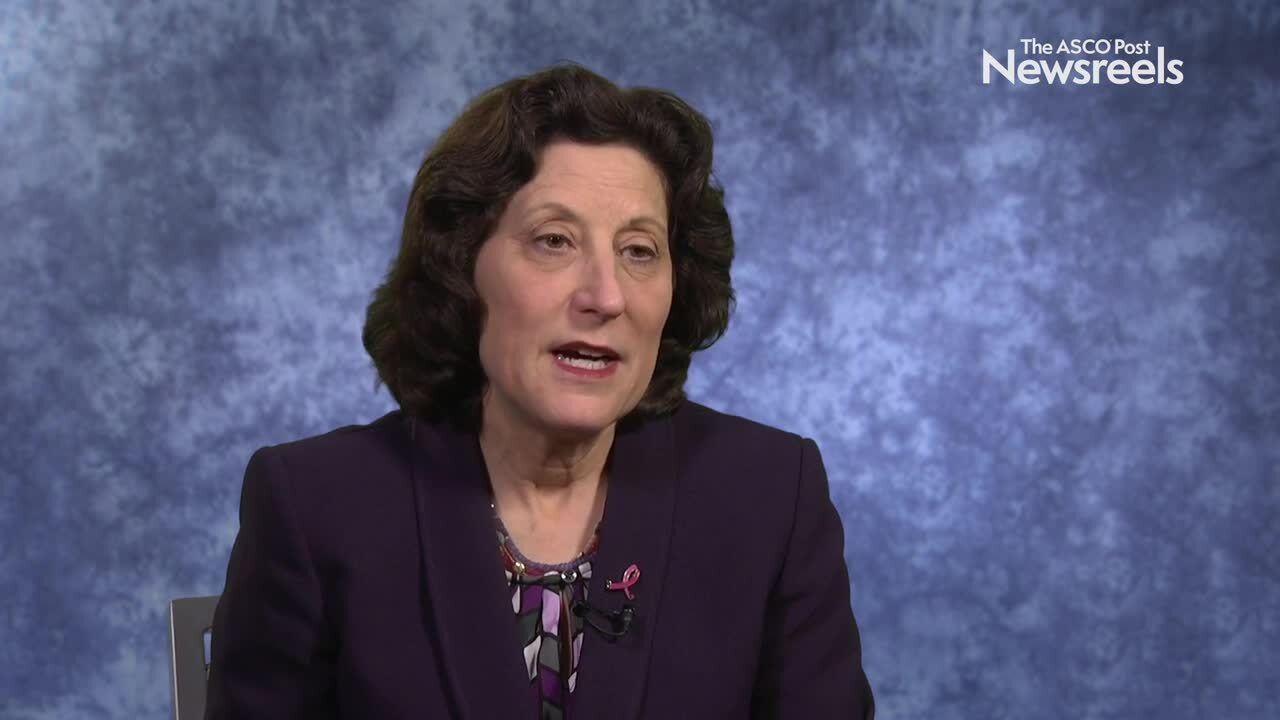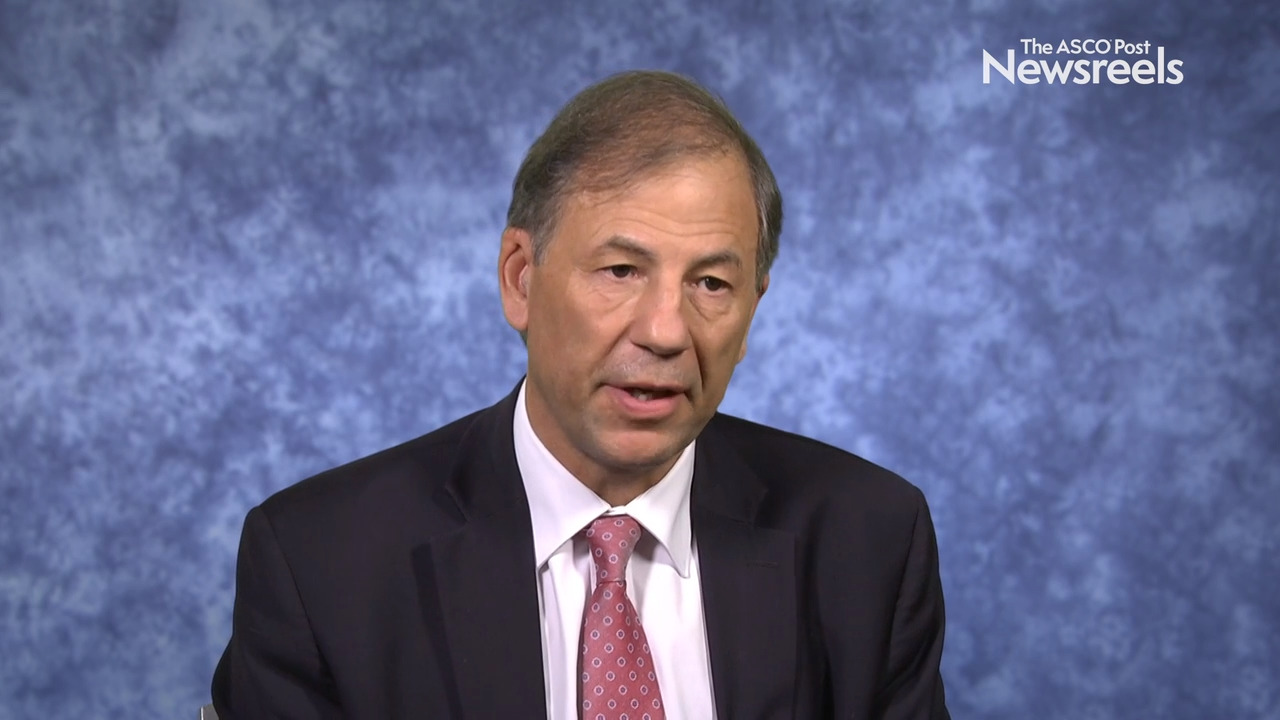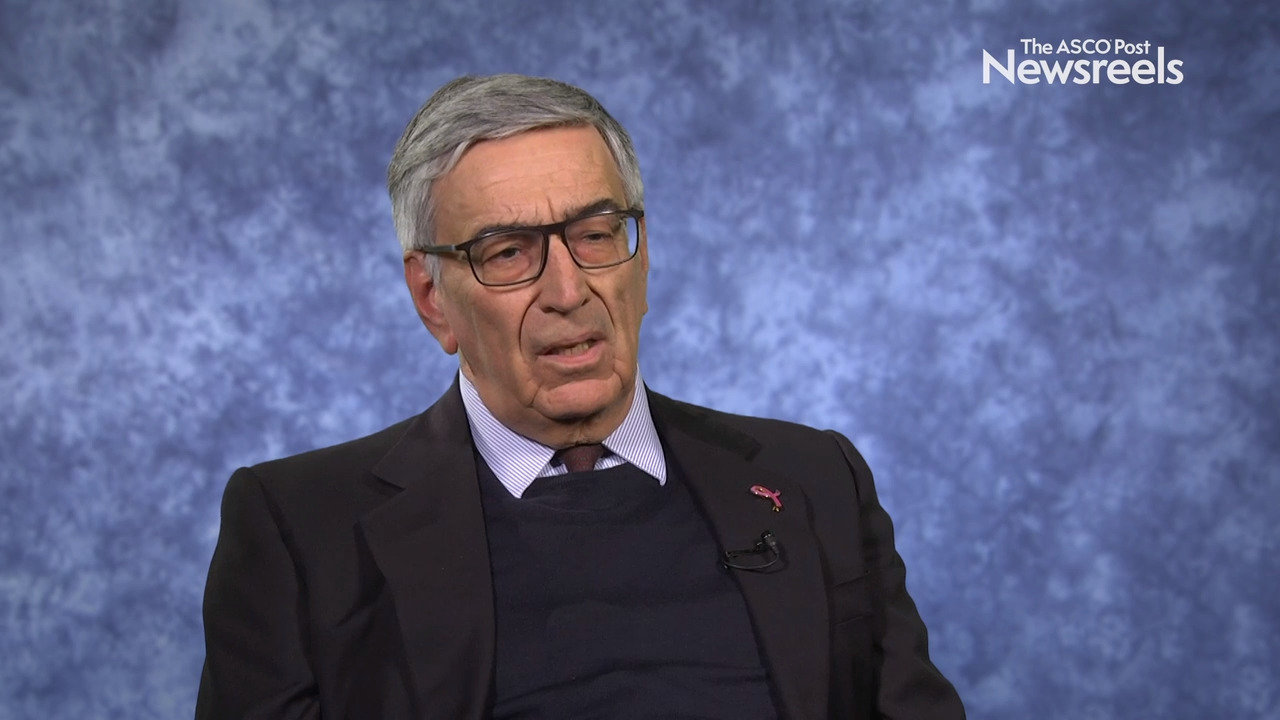2019 San Antonio Breast Cancer Symposium
Updates From Additional Clinical Trials in HER2-Positive Breast Cancer
Here we present summaries of several additional clinical trials in HER2-positive breast cancer reported over the past year. Jame Abraham, MD, Chair of the Division of Hematology and Oncology at the T...
Phase III SOPHIA Trial Evaluates Margetuximab/Chemotherapy vs Trastuzumab/Chemotherapy for HER2-Positive Breast Cancer
The second interim analysis of the phase III SOPHIA trial demonstrated a significant, though modest, improvement in progression-free survival, response rate, and clinical benefit with the addition of ...
Pooled Analysis Supports Benefit of Dual HER2-Targeted Therapy, but Questions Remain
In the treatment of HER2-positive early breast cancer, patients who receive dual HER2-targeted therapy in both the neoadjuvant and adjuvant settings are less likely to experience recurrence than those...
Expert Point of View: Virginia Kaklamani, MD, DSc, and Minetta Liu, MD
Virginia Kaklamani, MD, DSc, Professor of Medicine and Head of the Breast Cancer Program at UT Health San Antonio MD Anderson Cancer Center, moderated a press conference where Milan Radovich, PhD, re...
Studies Show Circulating Tumor Material May Predict Outcomes After Neoadjuvant Therapy for Breast Cancer
In early triple-negative breast cancer, the presence of circulating tumor DNA (ctDNA) and circulating tumor cells after neoadjuvant chemotherapy may enable risk stratification of patients for disease ...
Updates From Selected Clinical Trials in Breast Cancer
Each year, The ASCO Post asks Jame Abraham, MD, FACP, Chairman of the Department of Hematology and Medical Oncology at Taussig Cancer Institute and Professor of Medicine at the Cleveland Clinic Lerne...
Brief Highlights From the 2019 San Antonio Breast Cancer Symposium
In addition to our regular coverage of the 2019 San Antonio Breast Cancer Symposium, the following reports from the meeting include studies you may have missed. We hope you find them of interest. Ribo...
NSABP B-42 Trial 10-Year Update: Impact of Extended Letrozole on Disease-Free Survival
“In the 10-year analysis of the NSABP B-42 trial, the effect of extended treatment with 5 years of letrozole on disease-free survival persisted and reached statistical significance. There was no signi...
Investigators in Brazil Explore Availability, Cost, and Use of Biosimilar Trastuzumab in Patients With HER2-Positive Breast Cancer
Investigators in Brazil are seeking to explore the efficacy and safety of adjuvant biosimilar trastuzumab in a real-world study of patients with early HER2-positive breast cancer. In 2019, biosimilar ...
Expert Point of View: Sara M. Tolaney, MD, MPH
Sara M. Tolaney, MD, MPH, Assistant Professor of Medicine at Harvard Medical School and Associate Director of the Susan F. Smith Center for Women’s Cancers at Dana-Farber/Brigham and Women’s Cancer C...
Small Study Explores Impact of Novel Regimen on Pembrolizumab for Triple-Negative Breast Cancer
In the phase II KEYNOTE-890 trial, patients with inoperable advanced triple-negative breast cancer who received one intratumoral tavokinogene telseplasmid injection followed by electroporation and pem...
Phase III SOPHIA Trial Evaluates Margetuximab/Chemotherapy vs Trastuzumab/Chemotherapy for HER2-Positive Breast Cancer
The second interim analysis of the phase III SOPHIA trial demonstrated a significant though modest improvement in progression-free survival, response rate, and clinical benefit with the addition of ma...
Phase III KEYNOTE-522: Pembrolizumab Benefits Outcome in Neoadjuvant, Adjuvant Settings in Triple-Negative Breast Cancer
In patients with triple-negative breast cancer, the addition of pembrolizumab to neoadjuvant and adjuvant chemotherapy achieves higher rates of pathologic complete response compared with placebo, acco...
Adding Capecitabine to Systemic Therapies Improves Outcomes in Triple-Negative Breast Cancer
Capecitabine improves disease-free and overall survival for patients with triple-negative breast cancer, but only when it is added to other systemic therapies, not when it is used as a substitute, acc...
Expert Point of View: A. Jo Chien, MD
A. Jo Chien, MD, Associate Professor at UCSF’s Helen Diller Comprehensive Cancer Center, San Francisco, was the formal discussant of this abstract. Dr. Chien said that a median follow-up of 3-years i...
Adjuvant Ado-Trastuzumab Emtansine vs Paclitaxel Plus Trastuzumab in Early HER2-Positive Breast Cancer
Results of the randomized, phase II ATEMPT trial showed that the antibody-drug conjugate ado-trastuzumab emtansine (T-DM1) failed to demonstrate improved safety when compared with paclitaxel plus tras...
Expert Point of View: Steven J. Isakoff, MD, PhD
Steven J. Isakoff, MD, PhD, a medical oncologist at Massachusetts General Hospital, Boston, commented on the results of the DESTINY-Breast01 trial. “These data are extraordinarily encouraging, sugges...
Phase II DESTINY-Breast01: T-DXd Effective in Pretreated, Metastatic HER2-Positive Breast Cancer
In heavily pretreated patients with HER2-positive metastatic breast cancer [fam-]trastuzumab deruxtecan-nxki (T-DXd), a novel antibody-drug conjugate, achieved high response rates and durable response...
Expert Point of View: Steven J. Isakoff, MD, PhD
“With longer follow-up, the addition of pertuzumab to chemotherapy and trastuzumab appears to show benefit in hormone receptor–positive patients as well. In practice, we offer this regimen to node-po...
Chemotherapy, Trastuzumab, and Pertuzumab in Early HER2-Positive, Node-Positive Breast Cancer: Six-Year Follow-up of APHINITY Trial
Martine J. Piccart, MD, PhD, FASCO, reported that at 6-year follow-up of the APHINITY trial there was a modest, but not statistically significant, overall survival benefit for the addition of pertuzum...
Phase III HER2CLIMB Trial Yields Positive Data in Patients With HER2-Positive Metastatic Breast Cancer and Brain Metastasis
The investigational oral agent tucatinib added to trastuzumab/capecitabine reduced the risk of death by one-third and reduced the risk of disease progression or death by one-half in patients with heav...
Conference Highlights From the 2019 San Antonio Breast Cancer Symposium
More than 7,500 specialists in breast oncology from over 90 countries attended the 2019 San Antonio Breast Cancer Symposium (SABCS) held last December. Researchers convened to present a wide-ranging ...
Expert Point of View: Kevin Kalinsky, MD, MS
Commenting on SAFIR02-IMMUNO for The ASCO Post, Kevin Kalinsky, MD, MS, Associate Professor of Medicine at NewYork-Presbyterian Hospital/Columbia University Irving Medical Center, said the findings o...
Mixed Results With Durvalumab Maintenance in HER2-Negative Advanced Breast Cancer
Given as maintenance therapy, the checkpoint inhibitor durvalumab significantly improved overall survival in patients with metastatic triple-negative breast cancer and yielded a numerical but not sign...
No Improved Pathologic Complete Response With Atezolizumab in Early Triple-Negative Breast Cancer
The addition of the checkpoint inhibitor atezolizumab to chemotherapy with carboplatin and nab-paclitaxel failed to significantly improve pathologic complete response rates compared with chemotherapy ...
Expert Point of View: Sara M. Tolaney, MD, MPH
Sara M. Tolaney, MD, MPH, Assistant Professor of Medicine at Harvard Medical School and Associate Director of the Susan F. Smith Center for Women’s Cancers at Dana-Farber/Brigham and Women’s Cancer C...
Triple-Negative Breast Cancer Responds to Novel Therapy
The phase II KEYNOTE-890 trial is a small but interesting study in patients with inoperable advanced triple-negative breast cancer. After one injection of intratumoral tavokinogene telseplasmid, a pla...
Neoadjuvant and Adjuvant Pembrolizumab Improves Pathologic Complete Response Rate in Triple-Negative Breast Cancer
The addition of pembrolizumab to neoadjuvant and adjuvant chemotherapy achieves higher rates of pathologic complete response compared with placebo in patients with triple-negative breast cancer, accor...
Expert Point of View: Harold J. Burstein, MD, PhD, FASCO
Commenting on Dr. DeMichele’s poster presentation at the 2019 San Antonio Breast Cancer Symposium, Harold J. Burstein, MD, PhD, FASCO, Professor of Medicine at Harvard Medical School and a medical on...
Real-World Use of Palbociclib and Abemaciclib Explored in Two Studies Based on Electronic Health Records Database
Cyclin-dependent kinase 4 and 6 (CDK4/6) inhibitors are changing the landscape of the treatment of hormone receptor (HR)-positive/HER2-negative breast cancer. Three CDK4/6 inhibitors are approved by t...
When Added to Other Systemic Therapies, Capecitabine Improves Outcomes in Triple-Negative Breast Cancer
Capecitabine is often used to treat breast cancer, but the best use of capecitabine is open for discussion. According to a large meta-analysis of the effects of capecitabine in early breast cancer, ca...
Study Reports Similar Efficacy but No Less Toxicity With Adjuvant T-DM1 vs Taxane/Trastuzumab in Early Breast Cancer
The antibody-drug conjugate ado-trastuzumab emtansine (T-DM1) failed to show improved safety when compared with paclitaxel plus trastuzumab as adjuvant therapy in patients with stage 1 HER2-positive b...
Expert Point of View: Steven J. Isakoff, MD, PhD
“It is encouraging that the invasive disease–free survival observed in the primary analysis is holding up, particularly in the node-positive population. With longer follow-up, the addition of pertuzum...
APHINITY Update Supports Benefit of Pertuzumab-Based Triplet in Early HER2-Positive, Node-Positive Breast Cancer
Six-year follow-up of the APHINITY trial found a modest, but not statistically significant, overall survival benefit for the addition of pertuzumab to chemotherapy plus trastuzumab vs chemotherapy/tra...
Expert Point of View: Charles L. Shapiro, MD
Charles L. Shapiro, MD, Professor of Medicine, Hematology and Oncology at the Icahn School of Medicine at Mount Sinai, New York, commented on the Women’s Health Initiative update. “These trials invol...
Oral Paclitaxel Outperforms Intravenous Formulation in Phase III Trial
In the first reported phase III study of an oral taxane, an investigational oral form of paclitaxel yielded a higher overall response rate and produced less neuropathy than standard intravenous paclit...
Studies Find Estrogen Alone Protective, Estrogen Plus Progestin Detrimental in Postmenopausal Women
In postmenopausal women without prior breast cancer, estrogen alone reduced the risk of breast cancer, not only during treatment, but for years after estrogen was stopped. It also reduced deaths as a ...
Expert Point of View: Shelley Hwang, MD, MPH
Shelley Hwang, MD, MPH, the Mary and Deryl Hart Distinguished Professor of Surgery, Duke University School of Medicine in North Carolina, discussed the APBI IMRT Florence trial in a meeting highlight...
Partial-Breast Irradiation Favored Over Whole-Breast in Early Breast Cancer
Patients with early breast cancer with small, node-negative tumors can safely be treated with accelerated partial-breast irradiation using intensity-modulated radiotherapy. According to the 10-year me...
Expert Point of View: Debra A. Patt, MD, MPH, MBA, FASCO, and C. Kent Osborne, MD, FASCO
Debra A. Patt, MD, MPH, MBA, FASCO, Clinical Professor at Dell Medical School at The University of Texas at Austin and Executive Vice President of Public Policy and Strategy Initiatives for Texas Onc...
Breast Cancer Chemoprevention Effect Maintained Long After Stopping Anastrozole Therapy
For postmenopausal women at high risk for developing breast cancer—largely based on family history—anastrozole taken for 5 years maintained a preventive effect for at least an additional 7 years after...
Tucatinib Combination Extends Survival in HER2-Positive Metastatic Breast Cancer, Including Patients With Brain Metastases
For patients with progressing HER2-positive metastatic breast cancer previously treated with trastuzumab, pertuzumab, and ado-trastuzumab emtansine (T-DM1), no single regimen is an established standar...
Residual Cancer Burden Is Prognostic of Outcomes Across Breast Cancer Subtypes
Residual cancer burden after neoadjuvant chemotherapy can accurately predict disease recurrence and survival across all breast cancer subtypes, according to the findings from a meta-analysis presented...
Extended Letrozole Boosts Disease-Free Survival in 10-Year Update of NSABP B-42 Trial
“In the 10-year analysis of the NSABP B-42 trial, the effect of extended treatment with 5 years of letrozole on disease-free survival persisted and reached statistical significance. There was no signi...
Mixed Results With Weekly Nab-paclitaxel, Denosumab in Primary Breast Cancer
A weekly schedule of nab-paclitaxel as part of neoadjuvant chemotherapy significantly improved pathologic complete response compared with nab-paclitaxel given 2 weeks out of every 3 weeks (2/3) in pat...
Hope S. Rugo, MD, on Metastatic Triple-Negative Breast Cancer: Retrospective Analysis of PD-L1 Immunohistochemistry Assays
Hope S. Rugo, MD, of the University of California San Francisco Comprehensive Cancer Center, discusses a retrospective analysis on the effectiveness of the VENTANA PD-L1 SP142 assay, the Dako 22C3 ass...
Expert Point of View: Steven J. Isakoff, MD, PhD
Steven J. Isakoff, MD, PhD, a medical oncologist at Massachusetts General Hospital, Boston, commented on the results of the DESTINY-Breast01 trial. “These data are extraordinarily encouraging, sugges...
Novel Antibody-Drug Conjugate Shows Efficacy in Women With Pretreated, Metastatic HER2-Positive Breast Cancer
The novel antibody-drug conjugate [fam-] trastuzumab deruxtecan (T-DXd) achieved high response rates and durable responses in heavily pretreated patients with HER2-positive metastatic breast cancer, ...
Terry P. Mamounas, MD, MPH, on Extending Letrozole Treatment in Hormone Receptor–Positive Breast Cancer
Terry P. Mamounas, MD, MPH, of Orlando Health UF Health Cancer Center, discusses 10-year results from NRG Oncology/NSABP B-42, which showed that, for postmenopausal women with hormone receptor–positiv...
Luca Gianni, MD, on the Neoadjuvant Treatment of Triple-Negative Breast Cancer
Luca Gianni, MD, of the Fondazione Michelangelo, discusses findings from the NeoTRIP trial on pathologic complete response to neoadjuvant treatment with or without atezolizumab in triple-negative, ear...



